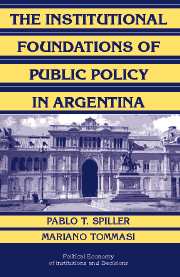Book contents
- Frontmatter
- Contents
- Acknowledgments
- Introduction
- I An Intertemporal Approach to Policy Making
- 1 Sketch of the Framework and Implications
- 2 A Theory of Intertemporal Political Cooperation
- II The Workings of Political Institutions, Policy Making, and Policies in Argentina
- Concluding Remarks
- References
- Index
- POLITICAL ECONOMY OF INSTITUTIONS AND DECISIONS
2 - A Theory of Intertemporal Political Cooperation
Published online by Cambridge University Press: 17 March 2011
- Frontmatter
- Contents
- Acknowledgments
- Introduction
- I An Intertemporal Approach to Policy Making
- 1 Sketch of the Framework and Implications
- 2 A Theory of Intertemporal Political Cooperation
- II The Workings of Political Institutions, Policy Making, and Policies in Argentina
- Concluding Remarks
- References
- Index
- POLITICAL ECONOMY OF INSTITUTIONS AND DECISIONS
Summary
This chapter uses the theory of repeated games to study the determinants of policy-making behavior. It provides a game-theoretical connection between elements of the policy-making game and the nature and characteristics of resulting policies. The abstract elements identified in the theory are mapped to observable aspects of political behavior ([4] in Figure 1.1). After identifying basic characteristics of political transactions, developing our basic model, and discussing its implications, we present some extensions that allow for richer characteristics of the underlying policy issues as well as for richer characterizations of the rules of the political game. At the end of the chapter, we discuss the potential empirical application of the framework for different policy issues and in different political environments.
CHARACTERISTICS OF POLITICAL TRANSACTIONS
A number of fundamental features, several of which are amenable to analysis from a transaction cost perspective, characterize the political transactions surrounding public policies. In this chapter, we provide a model that captures six of those features. They are as follows:
Intertemporal political exchanges. Politics and policy making take place over time. Decisions are made at different points in time, often by different configurations of actors, and decisions made at any point in time have future consequences.
The shifting bargaining power of political actors. Political popularity, coalition formation, and the normal workings of democracy lead to substantial randomness in the power of any political actor over time.
[…]
- Type
- Chapter
- Information
- The Institutional Foundations of Public Policy in ArgentinaA Transactions Cost Approach, pp. 26 - 48Publisher: Cambridge University PressPrint publication year: 2007



